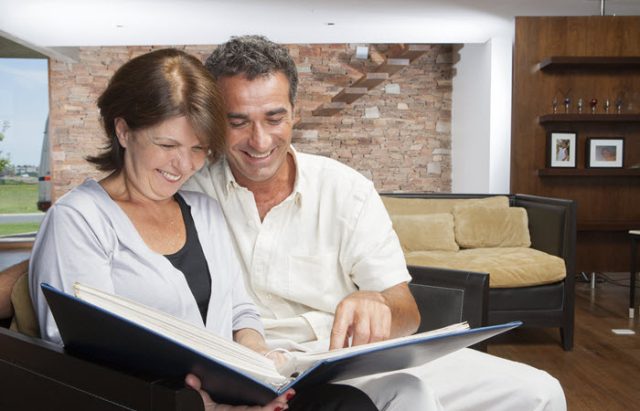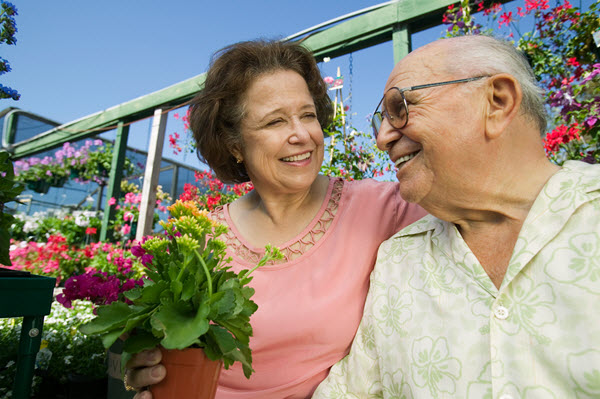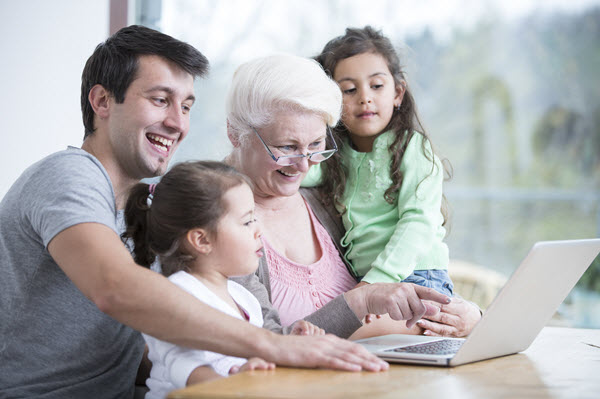Home Security System for Seniors
By Rebecca Hill
April 8, 2019 • Fact checked by Dumb Little Man

Elderly people don’t show much enthusiasm for technology, but when it comes to their safety, security, and independence, modern technology has proven to be quite useful in ensuring their peace of mind. Considering that most cases of assault, robbery, and other crimes against the elderly typically happen in or near their home, installing a comprehensive home security system can help to ensure the safety and wellbeing of your senior loved ones.
Reasons to get a home security system for seniors

The elderly have unique needs and concerns that can be adequately addressed with an alarm system. In terms of security, the mere sight of CCTV cameras can be a deterrent for potential burglars. Medical alert systems can make it easier to call for help in the event of an emergency, whereas automated home alarm systems can make it easier to monitor people arriving at the doorstep and let them in remotely.
Here are some of the common reasons to get a home security system for seniors:
- Family and caregivers can check in or monitor the home remotely via an app. Relatives will receive alerts when there’s a problem, or when an update is required. This gives them peace of mind.
- They help to inform you of any unusual events. From intrusions by burglars to smoke and fire, to frozen pipes and water leaks, there are many different types of home alarm systems that can be integrated with each other to protect you from every threat possible.
- Wearable medical assistance devices connected to the home security system can be helpful during emergencies by making panic buttons easily accessible to alert authorities immediately.
- Home security systems allow seniors to live more independently, as they can monitor different elements from one corner of the house.
In addition, many modern home security systems don’t require you to sign a long-term contract as one of the pre-requisites. So, whether your elderly loved one plans to sell their current home and downsize or move into an assisted living facility, you can ensure their safety and security now and move with your home alarm system. Generally, modern alarm systems are portable and flexible for use no matter the size of the house.
Factors to Consider when Choosing a Home Security System

When buying anything for the elderly, ease of use must be one of the top considerations. Whether you choose to install the home security yourself or using a professional, it must be user-friendly after setting it up.
The ideal home alarm system for seniors should offer:
1. Remote system activation
With their limited mobility and joint pain, the system should not require your elderly loved ones to get up just to turn it on and off. With remote activation, it will allow them to monitor, activate, and deactivate their alarm system from anywhere in the house rather than from the standard keypad. They will also receive mobile alerts straight to their mobile device when there’s a problem.
2. Alarm alert options
Considering that many seniors suffer from hearing loss and related problems, this poses the challenge of alerting them of emergencies during sleep when they’re not wearing their hearing aids. As such, the ideal alarm system should combine sound alarms with a bright strobing light that can help arouse the senior from sleep in the event of an emergency.
3. Extra-large keypad buttons
Another challenge that many seniors face is that of poor eyesight. Even with remote monitoring, a home alarm system is incomplete without the keypad. To make it easier for seniors to use, they should contain extra-large buttons that are also backlit for greater visibility.
4. Personal emergency button
Slips and falls are the number one cause of hospital emergency admissions for the elderly. If your elderly loved one spends a lot of time on their own, they should have an easy way to raise alarm and call for help. Emergency alert buttons can be integrated into wearable devices such as a bracelet or pendant for easy access. Once pressed, they automatically connect to a medical emergency call center that can send help immediately.
Best Home Security Systems and Devices for Seniors
Finding the right home security system requires a proper assessment of requirements to determine the things that your elderly loved one needs to remain secure in their own home.
Generally, seniors need a system that will protect their property from intrusion – including doors, windows, and other entryways; as well as one that makes it easier to report medical emergencies for immediate assistance.
The ideal system should comprise:
1. Burglar alarm system
These systems provide the elderly with complete protection against a multitude of threats, including fire, burglaries, toxic gases (natural gas, carbon monoxide, propane), and medical emergencies. With their limited mobility, seniors can be easy targets for burglars. A home burglary alarm with window, door, and motion sensors installed in every entryway can alert you and the monitoring center in the event of a break in or tampering. The presence of a security system itself can help to deter most burglars.
2. Medical alert systems
Another valuable service in any home alarm system for seniors is the medical emergency system. The elderly have an increased risk of slipping and falling or getting involved in another home accident, which can be fatal if the senior lives alone. Medical alert systems allow seniors to call for assistance from a connected monitoring center with the simple push of a button, strategically placed in a wearable device such as a bracelet or pendant.
3. Home automation
Home automation involves the use of technology to automatically complete some types of household activities with little to no user intervention, using remote control. This makes the house safer and more convenient and enjoyable to perform basic tasks. Automation can be used to improve the lives of seniors in terms of:
- Easier health care through remote monitoring, daily medical testing, medication reminders, medical care coordination, and remote medical consultation
- Long distance caregiving by coordinating family caregiving, enhancing communication and relationships, and fighting loneliness
- Home safety by improving lighting, security, and fall prevention
Home automation can also promote connectivity, entertainment, and other internet activities for maximum enjoyment.
4. Remote control access
Whether your elderly loved one has trouble getting around or is hardly every home because of traveling, the ability to control different aspects of your home remotely is invaluable. A modern, automated home security system can be monitored and controlled remotely through mobile devices so that everything from the lighting to door locks to video cameras can be controlled from a smartphone. This makes it possible for the elderly to perform multiple tasks without moving a muscle.
Conclusion
Thanks to medical advances and relevant information as well as the means to maintain healthier lifestyles, many seniors are living substantially longer. And with most of them choosing to stay independently in their own homes rather than in assisted living facilities, it is important that you facilitate their decision and make their environment as safe as possible.
A comprehensive home security system can deliver the safety and protection they need from most threats to enjoy their independence. This will also give concerned family members peace of mind in knowing that their senior loved ones are safe and sound.
See Also: Senior Care- What You Need To Know About Assisted Living
Rebecca Hill
Rebecca Hills is the community manager at Oegema, Nicholson & Associates. She loves to write about home security and home improvement. She leverages her knowledge to educate people for keeping their homes safe.


